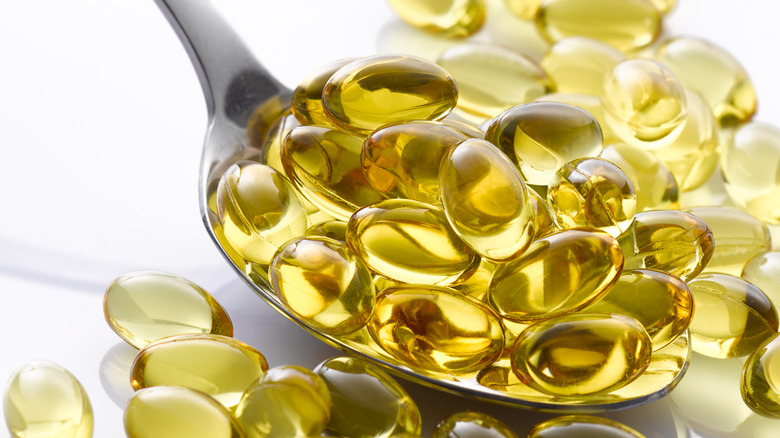The Unexpected Vitamin That Can Increase The Risk Of Prostate Cancer
It's logical to think that upping our vitamin intake may help reduce our risk for certain cancers. In a 2011 study published in Integrative Cancer Therapies, over 59% of men who had a sibling diagnosed with prostate cancer reported having used vitamins or supplements with the belief that doing so may lower their risk of developing the disease. However, according to a 2011 longitudinal study published in JAMA Network, there's one vitamin in particular that may instead make some people more prone to prostate cancer: vitamin E. Found in a variety of nuts and seeds, vitamin E is said to have anti-inflammatory properties, support immunity, and may help fight against cell damage from free radicals (via Sultan Qaboos University Medical Journal).
Research regarding the relationship between vitamin E and cancer has been inconclusive, often producing varied results. While early research suggested that vitamin E may harbor protective properties against cancer, more recent research indicates this may not be the case for prostate cancer — a disease responsible for 1 in every 44 deaths among people with prostates, according to the American Cancer Society.
Vitamin E may have cancer-promoting effects
In the 2011 JAMA Network study, researchers revisited findings from an earlier trial that showed selenium and/or vitamin E supplementation did not lower prostate cancer risk, but instead, demonstrated an increased risk for the disease albeit one that was considered statistically nonsignificant. The research involved more than 35,500 healthy men who were either given selenium supplements in combination with a vitamin E placebo, vitamin E supplements with a selenium placebo, both supplements, or both placebos. Participants were monitored over the course of 7 to 12 years. The study findings showed that vitamin E supplementation significantly increased men's susceptibility to prostate cancer. However this risk was not seen in those who received both vitamin E and selenium supplements, indicating that selenium may counteract vitamin E's potential negative effects on prostate cancer risk.
Researchers from a 2019 laboratory study published in Scientific Reports decided to take a closer look at what could potentially be going on behind the scenes regarding vitamin E and prostate cancer risk. What they found was that vitamin E appeared to have cancer-promoting effects, such as stimulating cell transformation, and promoting DNA damage due to enhanced oxidative stress.
Further research is needed regarding vitamin E and prostate cancer risk
Presently, more research is needed to confirm a potential relationship between vitamin E and prostate cancer. The results of the 2019 study could not be deemed definitive, seeing as the study was conducted on cells and animal models and involved larger amounts of vitamin E than those used in the 2011 JAMA Network study. Furthermore, the National Cancer Institute highlights that some research has shown no connection between prostate cancer risk and vitamin E, lending further support to the need for more study on the subject.
Most of us have our vitamin E intake covered through diet, so you may want to think twice before taking vitamin E in supplement form as it can come with possible side effects. Although uncommon, Mayo Clinic experts explain that potential side effects include nausea, diarrhea, blurred vision, rash, headache, and more. Consumption of vitamin E may also be life-threatening for people with certain health conditions. Check with your doctor before starting any new supplement medications, and be aware of signs indicating you may be taking too much vitamin E.


